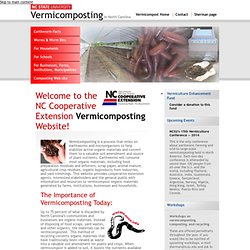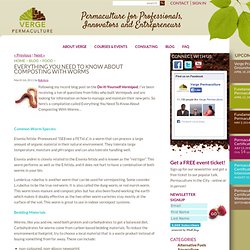

Vermicomposting in North Carolina. Vermicomposting is a process that relies on earthworms and microorganisms to help stabilize active organic materials and convert them to a valuable soil amendment and source of plant nutrients.

Earthworms will consume most organic materials, including food preparation residuals and leftovers, scrap paper, animal manure, agricultural crop residues, organic byproducts from industries, and yard trimmings. This website provides cooperative extension agents, interested stakeholders and the general public with information and resources to vermicompost organic materials generated by farms, institutions, businesses and households. Up to 75 percent of what is discarded by North Carolina’s communities and businesses are organic materials. Instead of disposing of food scraps, yard wastes, and other organics, the materials can be vermicomposted. How to Build A Flow Through Worm Bin. Everything You Need to Know About Composting With Worms. Following my recent blog post on the Do-It-Yourself Vermipod, I’ve been receiving a ton of questions from folks who built Vermipods and are looking for information on how to manage and maintain their new pets.

So here’s a compilation called Everything You Need To Know About Composting With Worms… Common Worm Species Eisenia fetida: Pronounced “iSEEnee a FETid a”, is a worm that can process a large amount of organic material in their natural environment. They tolerate large temperature, moisture and pH ranges and can also tolerate handling well. Eisenia andrei is closely related to the Eisenia fetida and is known as the “red tiger”.